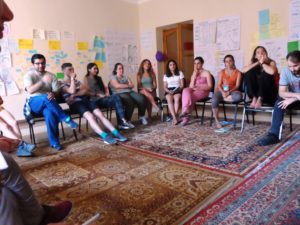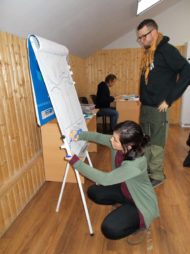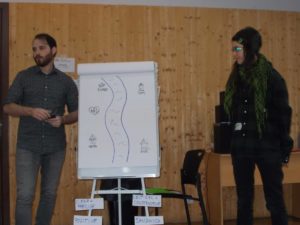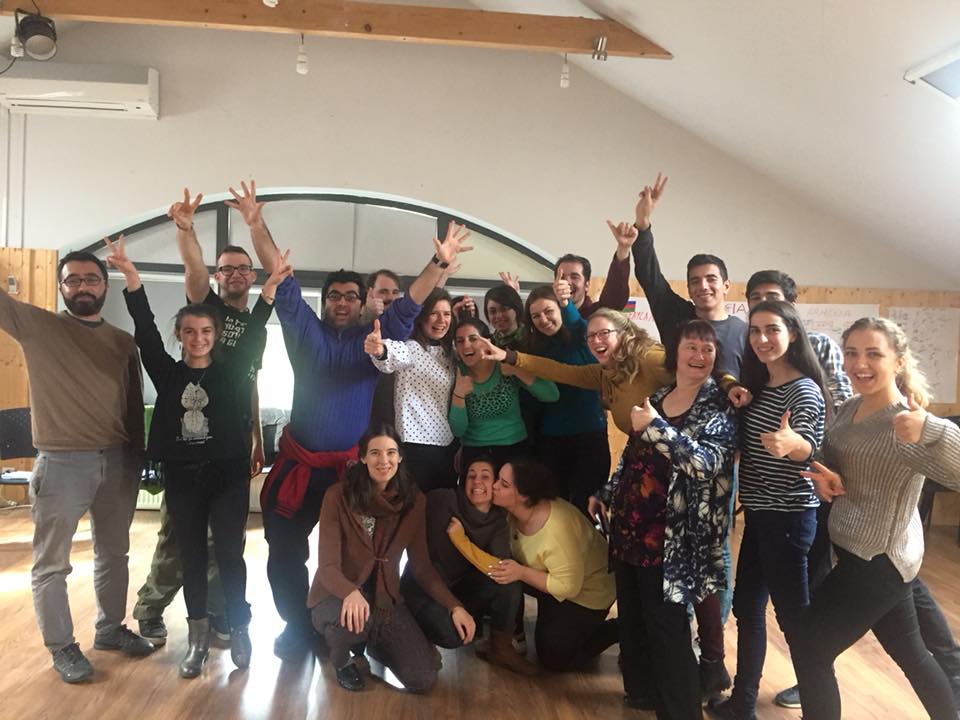The training course Laboratory Training: Designing Learning for Peace Education was a very special opportunity for the development of practical design processes around education for Peace. The training, which lasted 5 months and had several modules (online and in person), was a very enriching and powerful experience that revolved around a toolkit that had been done previously but had to be put into practice.

The working group consisted of 24 participants, with backgrounds from up to 7 countries, which gave a wide variety of experiences and a rich range of professional fields. In addition to the cultural exchange, I think it is very interesting to work with people with different experience, and more so if they are from other parts of the world, because it gives a very valuable perspective.
The first block (3 online modules taught during August), were used to start working with the theoretical base of the course, focused on the clarification of terms such as peace-violence, conflict, resolution and transformation of conflicts, formal education vs. non-formal, peace building mechanisms, etc. The theoretical part became a bit condensed, but the facilitation done by the trainers made it more fun and interesting, since online work was done in materials such as texts, video conferences and other resources.
Once this work was done we arrived at block 2, where the training was face-to-face for a week in Kobuleti, Georgia. The experience was unbeatable and we learned a lot in relation to the application of new methodologies for the work of Education for Peace. The sessions, of hour and a half and with breaks between them, always became interesting although, truthfully, at the end of the day we were all exhausted and surrendered. Both the trainers and the local organizers were completely up to my expectations and were very cool days, where we established links that will remain alive for a long time.

Returning home after this intense September, we faced block 3, another online training with 3 more modules where the aim was the preparation of the second part of the training course. That is, when we met again in December, we participants would change roles and become trainers. This way, putting into practice all the contents that had been worked on before, we could be more concrete in the learned facts and we would have a more complete experience. Those two months served to prepare both content, organization and planning of the course in pairs within two more generic work groups; Education for the Construction of Peace (Peacebuilding) and Education for the Experience of Peace (Peaceliving), with a shared theme for all, consisting in the processes of radicalization and extremism.
 The fourth and last block was hold in Rustavi, another city in Georgia, for a week. There we developed the sessions that we had been preparing and we had the return and evaluation of the rest of our classmates. The experience was very interesting and at the same time a challenge, since many people in the group did not have experience in facilitating groups. However, the sessions were enjoyable and we learned a lot in a more conceptual level, as well as dynamics and exercises to be put into practice. On a personal level, for me it also meant a reinforcement of all those relationships that we had been growing since September, now making them stronger and deeper.
The fourth and last block was hold in Rustavi, another city in Georgia, for a week. There we developed the sessions that we had been preparing and we had the return and evaluation of the rest of our classmates. The experience was very interesting and at the same time a challenge, since many people in the group did not have experience in facilitating groups. However, the sessions were enjoyable and we learned a lot in a more conceptual level, as well as dynamics and exercises to be put into practice. On a personal level, for me it also meant a reinforcement of all those relationships that we had been growing since September, now making them stronger and deeper.
All in all, a good cocktail that we now have to digest and start thinking about implementation strategies, since with the experience gained now, there is a lot of desire to work at home and in a network with other entities in specific projects. The three Catalan participants that are part of it are a very nice team, that came back with full energy and with the conviction that Education for Peace is an applicable and essential reality.
Neus Rosell.

